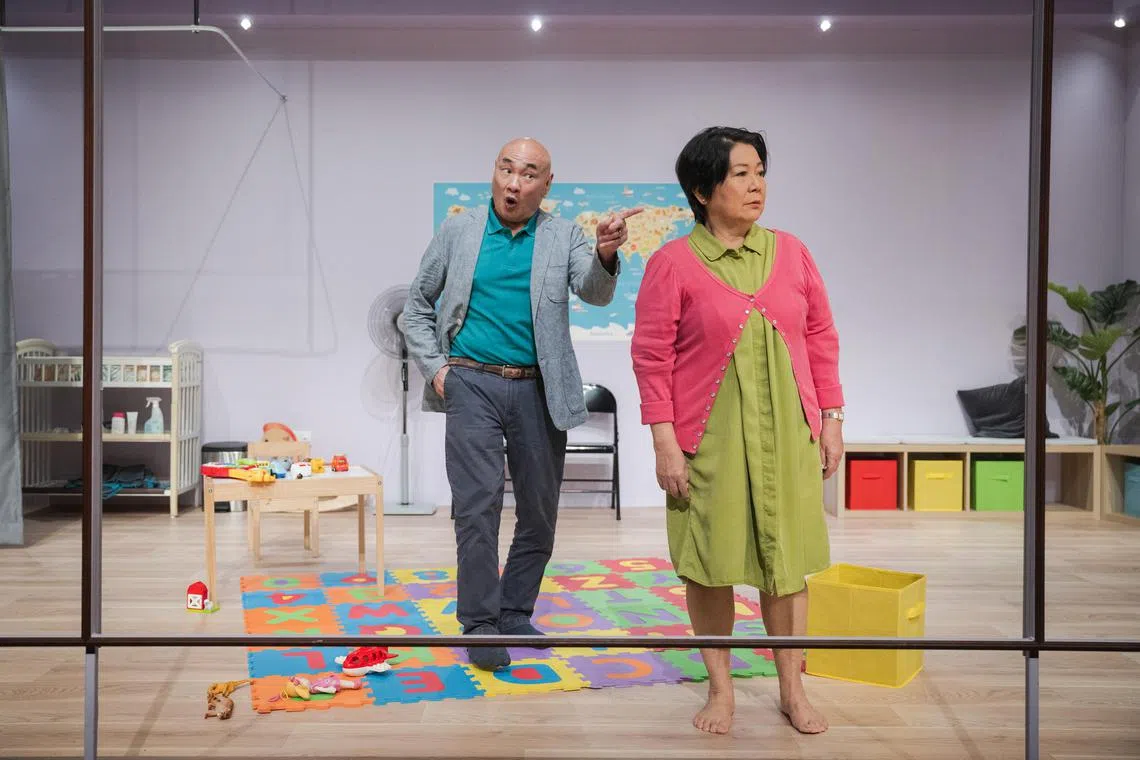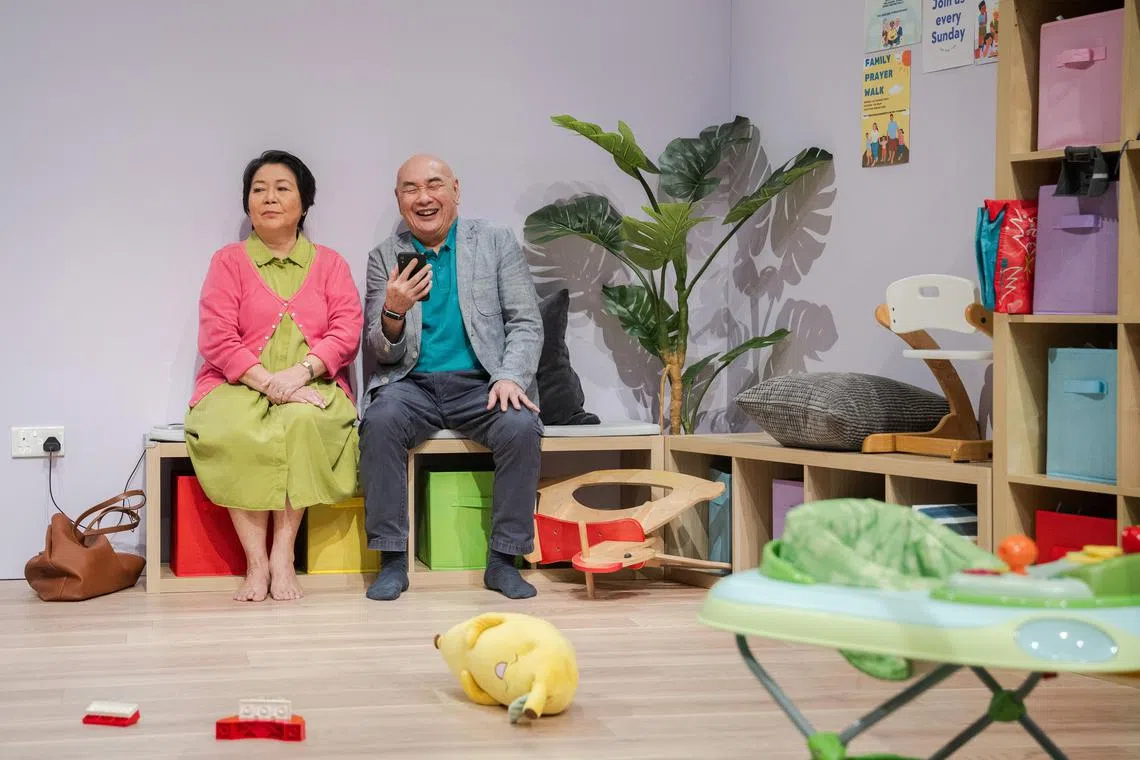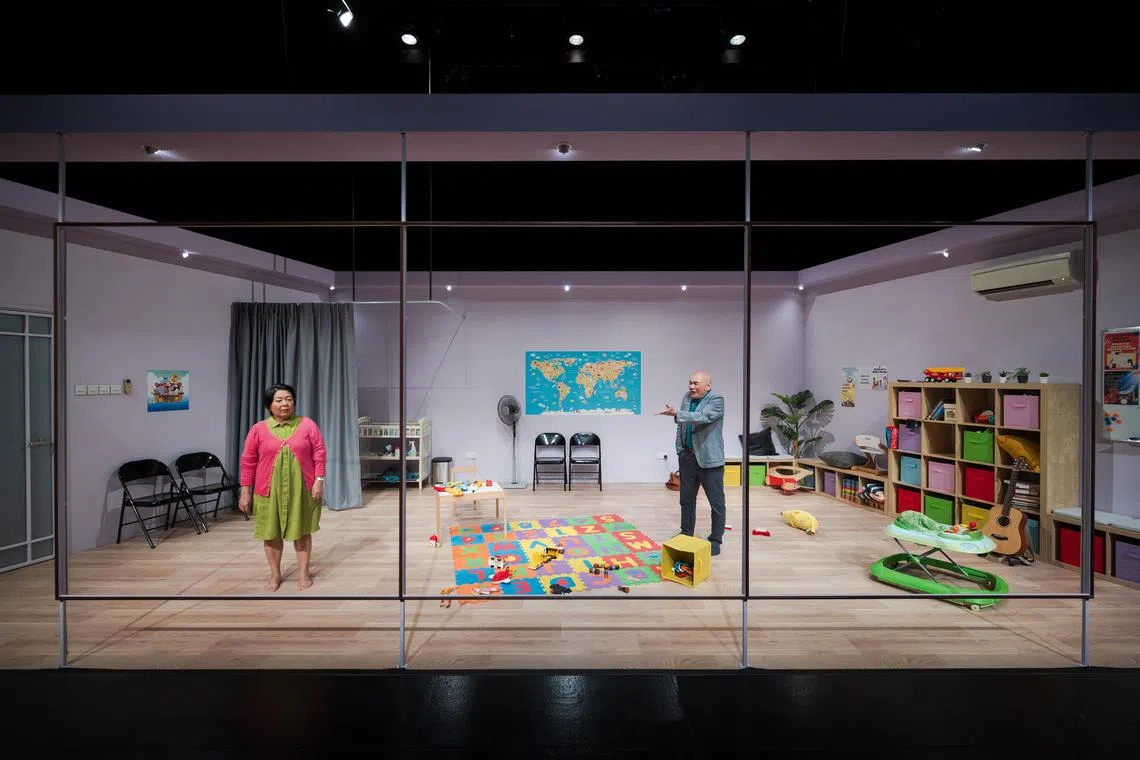Theatre review: Stellar acting in Tender Submission, but it preaches to the choir
Sign up now: Get ST's newsletters delivered to your inbox

Real-life couple Lim Kay Siu and Neo Swee Lin play a married couple in Checkpoint Theatre's Tender Submission, written by playwright Lucas Ho.
PHOTO: JOSEPH NAIR
Follow topic:
Tender Submission
Checkpoint Theatre
Drama Centre Black Box
Thursday, 8pm
Consider a situation in which you witness a single explosive argument between a married couple with decades of repressed grudges. Old grievances the couple dredge up make sense to them and only them. An onlooker, while empathetic, is likely also perplexed at their capacity for such intensity.
Things often feel this way in Tender Submission – Lucas Ho’s third full-length play with Checkpoint Theatre
The central conflict, it seems initially, is that Catherine and David (played by real-life married couple Neo Swee Lin and Lim Kay Siu) have forged 30 years of marriage together as devout Christians but are starting to see a divergence in their faith.
Both want to do the good works for their God – their disagreement is how.
Catherine – high-strung, frosty, hiding a woundedness behind a tough exterior – is hoping for their 3,000-strong church to support a vote she has put in motion for the tender of a public site where she wants to touch lives without overt proselytising.
Flippant, loose-tongued David, meanwhile, dismisses his wife’s work – preferring to measure impact by church conversions.
Under Huzir Sulaiman and Chen Yingxuan’s co-direction, Neo and Lim are nuanced realisations of a couple unshakeable in their faith. The whole play exudes Checkpoint’s signature realism in a bold one-scene script that plays out in real time, such that it feels like the audience is eavesdropping on their lives.
The duo are by turns affectionate and withdrawn, accommodating and intransigent to each other’s beliefs. They appear painfully human in some scenes, then thoroughly unsympathetic in others.
The conflict over the tender submission and their faith is a proxy for other quarrels – on gender roles, marital faithfulness, their daughter and their friendships.
But to this reviewer, unfamiliar with the ins and outs of church politics and the finer gradations of differences in faith, the reasons for the couple’s disputes never quite come to light and remain obscured in Bible verses, heavy allusions and church constitution.
The couple’s speech is a brilliantly dense church argot in Ho’s script, which is testament to the fullness of these characters of unshakeable faith and their religious upbringing even as it shuts out the uninitiated.
While the stakes of the conflict feel emotionally clear for the two characters, it seems unsatisfying – even if arguably accurate to the two devout, conservative characters – that the wider stakes of their decision to expand the church’s influence in secular society are never quite broached or addressed.

Catherine and David await the outcome on an important vote in the church.
PHOTO: JOSEPH NAIR
The role of religion in secular society, while the frame for this story, remains a neglected spectre that lingers at the edge of the play’s vision.
Perhaps it is to be expected of a two-hander about internal strife within a marriage and religious institution – there are no counterpoints or rejoinders to their entrenched positions, making the duo’s cores hard to penetrate from the outside.
It may be that someone who finds himself or herself already in Catherine and David’s shoes would glean more from the subjectivity of the play.
From the outside, it feels like it preaches to its own choir. The mode of spectating becomes more anthropological – a look into the way evangelical, socially conservative Christians persuade, defend, advocate, surrender and congregate among themselves.

Empty frames in Petrina Dawn Tan’s set invites and alienates.
PHOTO: JOSEPH NAIR
Petrina Dawn Tan’s set is powerful in that regard. Set in a church’s cry room, she places a triptych of empty rectangle frames stage front, giving the audience an impression of having a direct line of sight into the soundproof room and overhearing the couple’s unguarded conversation.
It is, too, a frame which alienates – reminding the audience that one is always looking from a distance into their world. It serves as a metaphor for the solipsism of one’s beliefs, religious or secular, even if one believes otherwise.
Whether you interpret the frames as inviting, alienating or both, Tender Submission comes across as a Rorschach test where one projects his or her personal investments, or lack thereof, in the subject matter.
Tender Submission, which runs till Aug 27, is sold out.

